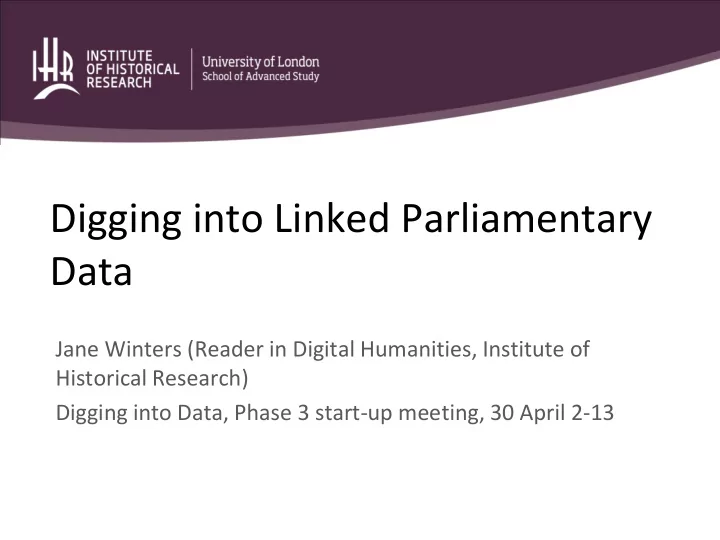

Digging into Linked Parliamentary Data Jane Winters (Reader in Digital Humanities, Institute of Historical Research) Digging into Data, Phase 3 start-up meeting, 30 April 2-13
The data • UK Hansard (House of Commons debates, 1803 to the present • Canadian Hansard (1867 to the present) • Parliamentary proceedings of the Netherlands, 1814 to the present)
Aims and objectives • To enhance the existing corpus of parliamentary data, 1803-2014, using NLP and linked data • To develop new and adapt existing tools which will allow the comparative, longitudinal study of the enhanced data • To explore substantive research questions which will both test and inform the development of those tools
The project team • Canada – Chris Cochrane, Graeme Hirst and Nona Naderi (University of Toronto) • Netherlands – Jaap Kamps and Maarten Marx (University of Amsterdam) • UK – Jonathan Blaney, Martin Steer and Jane Winters (IHR); Richard Gartner (KCL); Paul Seaward (History of Parliament); Luke Blaxill (University of Oxford)
Key deliverables • A joint dataset covering all three jurisdictions, available as enriched XML proceedings and RDF triples linked to DBpedia • A range of NLP tools for the comparative longitudinal study of parliamentary data • Substantive case studies focusing on left/right ideological polarisation and migration • End-of-project big data workshop
Previous work • Political Mashup project - http://politicalmashup.nl/ • Linking Parliamentary Records through Metadata (LIPARM) - http://www.liparm.ac.uk/ • Millbank Hansard - http://hansard.millbanksystems.com/ • They Work For You - http://www.theyworkforyou.com/ • PARLINFO - http://www.parl.gc.ca/parlinfo/
Communication • Project website and blog – http://dilipad.history.ac.uk • Twitter account - @parl_data • Series of short video interviews with project team • Draft articles presented for open peer review on the project website • Conference and seminar presentations • Final two-day big data workshop • Four peer-reviewed scholarly articles
Measuring success • Comparison of enhanced UK and Canadian data with gold standard of Dutch data • Acceptance of Parliamentary Markup Language (PML) schema by TEI • Usage of data and tools • User testing and feedback • Peer review • On-going collaboration between project partners
Recommend
More recommend